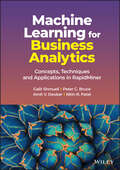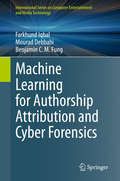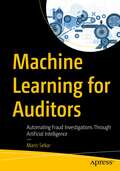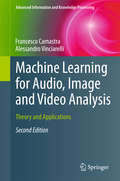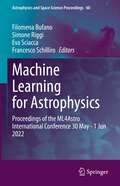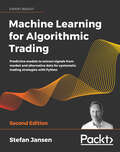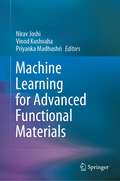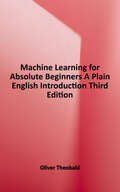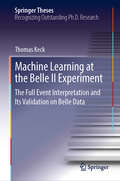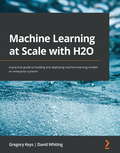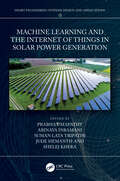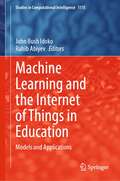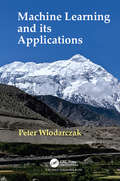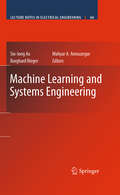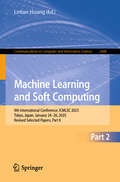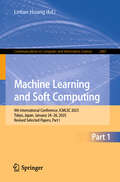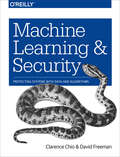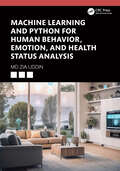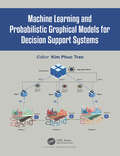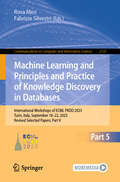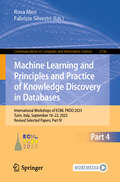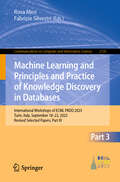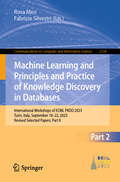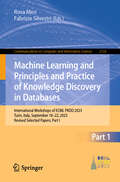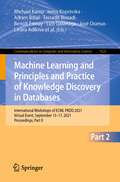- Table View
- List View
Machine Learning for Business Analytics: Concepts, Techniques and Applications in RapidMiner
by Galit Shmueli Peter C. Bruce Nitin R. Patel Amit V. DeokarMachine Learning for Business Analytics Machine learning—also known as data mining or data analytics—is a fundamental part of data science. It is used by organizations in a wide variety of arenas to turn raw data into actionable information. Machine Learning for Business Analytics: Concepts, Techniques and Applications in RapidMiner provides a comprehensive introduction and an overview of this methodology. This best-selling textbook covers both statistical and machine learning algorithms for prediction, classification, visualization, dimension reduction, rule mining, recommendations, clustering, text mining, experimentation and network analytics. Along with hands-on exercises and real-life case studies, it also discusses managerial and ethical issues for responsible use of machine learning techniques. This is the seventh edition of Machine Learning for Business Analytics, and the first using RapidMiner software. This edition also includes: A new co-author, Amit Deokar, who brings experience teaching business analytics courses using RapidMiner Integrated use of RapidMiner, an open-source machine learning platform that has become commercially popular in recent years An expanded chapter focused on discussion of deep learning techniques A new chapter on experimental feedback techniques including A/B testing, uplift modeling, and reinforcement learning A new chapter on responsible data science Updates and new material based on feedback from instructors teaching MBA, Masters in Business Analytics and related programs, undergraduate, diploma and executive courses, and from their students A full chapter devoted to relevant case studies with more than a dozen cases demonstrating applications for the machine learning techniques End-of-chapter exercises that help readers gauge and expand their comprehension and competency of the material presented A companion website with more than two dozen data sets, and instructor materials including exercise solutions, slides, and case solutions This textbook is an ideal resource for upper-level undergraduate and graduate level courses in data science, predictive analytics, and business analytics. It is also an excellent reference for analysts, researchers, and data science practitioners working with quantitative data in management, finance, marketing, operations management, information systems, computer science, and information technology.
Machine Learning for Authorship Attribution and Cyber Forensics (International Series on Computer Entertainment and Media Technology)
by Mourad Debbabi Benjamin C. Fung Farkhund IqbalThe book first explores the cybersecurity’s landscape and the inherent susceptibility of online communication system such as e-mail, chat conversation and social media in cybercrimes. Common sources and resources of digital crimes, their causes and effects together with the emerging threats for society are illustrated in this book. This book not only explores the growing needs of cybersecurity and digital forensics but also investigates relevant technologies and methods to meet the said needs. Knowledge discovery, machine learning and data analytics are explored for collecting cyber-intelligence and forensics evidence on cybercrimes.Online communication documents, which are the main source of cybercrimes are investigated from two perspectives: the crime and the criminal. AI and machine learning methods are applied to detect illegal and criminal activities such as bot distribution, drug trafficking and child pornography. Authorship analysis is applied to identify the potential suspects and their social linguistics characteristics. Deep learning together with frequent pattern mining and link mining techniques are applied to trace the potential collaborators of the identified criminals.Finally, the aim of the book is not only to investigate the crimes and identify the potential suspects but, as well, to collect solid and precise forensics evidence to prosecute the suspects in the court of law.
Machine Learning for Auditors: Automating Fraud Investigations Through Artificial Intelligence
by Maris SekarUse artificial intelligence (AI) techniques to build tools for auditing your organization. This is a practical book with implementation recipes that demystify AI, ML, and data science and their roles as applied to auditing. You will learn about data analysis techniques that will help you gain insights into your data and become a better data storyteller. The guidance in this book around applying artificial intelligence in support of audit investigations helps you gain credibility and trust with your internal and external clients. A systematic process to verify your findings is also discussed to ensure the accuracy of your findings.Machine Learning for Auditors provides an emphasis on domain knowledge over complex data science know how that enables you to think like a data scientist. The book helps you achieve the objectives of safeguarding the confidentiality, integrity, and availability of your organizational assets. Data science does not need to be an intimidating concept for audit managers and directors. With the knowledge in this book, you can leverage simple concepts that are beyond mere buzz words to practice innovation in your team. You can build your credibility and trust with your internal and external clients by understanding the data that drives your organization.What You Will LearnUnderstand the role of auditors as trusted advisorsPerform exploratory data analysis to gain a deeper understanding of your organizationBuild machine learning predictive models that detect fraudulent vendor payments and expensesIntegrate data analytics with existing and new technologiesLeverage storytelling to communicate and validate your findings effectivelyApply practical implementation use cases within your organizationWho This Book Is ForAI Auditing is for internal auditors who are looking to use data analytics and data science to better understand their organizational data. It is for auditors interested in implementing predictive and prescriptive analytics in support of better decision making and risk-based testing of your organizational processes.
Machine Learning for Audio, Image and Video Analysis
by Alessandro Vinciarelli Francesco CamastraThis second edition focuses on audio, image and video data, the three main types of input that machines deal with when interacting with the real world. A set of appendices provides the reader with self-contained introductions to the mathematical background necessary to read the book. Divided into three main parts, From Perception to Computation introduces methodologies aimed at representing the data in forms suitable for computer processing, especially when it comes to audio and images. Whilst the second part, Machine Learning includes an extensive overview of statistical techniques aimed at addressing three main problems, namely classification (automatically assigning a data sample to one of the classes belonging to a predefined set), clustering (automatically grouping data samples according to the similarity of their properties) and sequence analysis (automatically mapping a sequence of observations into a sequence of human-understandable symbols). The third part Applications shows how the abstract problems defined in the second part underlie technologies capable to perform complex tasks such as the recognition of hand gestures or the transcription of handwritten data. Machine Learning for Audio, Image and Video Analysis is suitable for students to acquire a solid background in machine learning as well as for practitioners to deepen their knowledge of the state-of-the-art. All application chapters are based on publicly available data and free software packages, thus allowing readers to replicate the experiments.
Machine Learning for Astrophysics: Proceedings of the ML4Astro International Conference 30 May - 1 Jun 2022 (Astrophysics and Space Science Proceedings #60)
by Filomena Bufano Simone Riggi Eva Sciacca Francesco SchilliroThis book reviews the state of the art in the exploitation of machine learning techniques for the astrophysics community and gives the reader a complete overview of the field. The contributed chapters allow the reader to easily digest the material through balanced theoretical and numerical methods and tools with applications in different fields of theoretical and observational astronomy. The book helps the reader to really understand and quantify both the opportunities and limitations of using machine learning in several fields of astrophysics.
Machine Learning for Algorithmic Trading: Predictive models to extract signals from market and alternative data for systematic trading strategies with Python, 2nd Edition
by Stefan JansenLeverage machine learning to design and back-test automated trading strategies for real-world markets using pandas, TA-Lib, scikit-learn, LightGBM, SpaCy, Gensim, TensorFlow 2, Zipline, backtrader, Alphalens, and pyfolio.Purchase of the print or Kindle book includes a free eBook in the PDF format.Key FeaturesDesign, train, and evaluate machine learning algorithms that underpin automated trading strategiesCreate a research and strategy development process to apply predictive modeling to trading decisionsLeverage NLP and deep learning to extract tradeable signals from market and alternative dataBook DescriptionThe explosive growth of digital data has boosted the demand for expertise in trading strategies that use machine learning (ML). This revised and expanded second edition enables you to build and evaluate sophisticated supervised, unsupervised, and reinforcement learning models.This book introduces end-to-end machine learning for the trading workflow, from the idea and feature engineering to model optimization, strategy design, and backtesting. It illustrates this by using examples ranging from linear models and tree-based ensembles to deep-learning techniques from cutting edge research.This edition shows how to work with market, fundamental, and alternative data, such as tick data, minute and daily bars, SEC filings, earnings call transcripts, financial news, or satellite images to generate tradeable signals. It illustrates how to engineer financial features or alpha factors that enable an ML model to predict returns from price data for US and international stocks and ETFs. It also shows how to assess the signal content of new features using Alphalens and SHAP values and includes a new appendix with over one hundred alpha factor examples.By the end, you will be proficient in translating ML model predictions into a trading strategy that operates at daily or intraday horizons, and in evaluating its performance.What you will learnLeverage market, fundamental, and alternative text and image dataResearch and evaluate alpha factors using statistics, Alphalens, and SHAP valuesImplement machine learning techniques to solve investment and trading problemsBacktest and evaluate trading strategies based on machine learning using Zipline and BacktraderOptimize portfolio risk and performance analysis using pandas, NumPy, and pyfolioCreate a pairs trading strategy based on cointegration for US equities and ETFsTrain a gradient boosting model to predict intraday returns using AlgoSeek's high-quality trades and quotes dataWho this book is forIf you are a data analyst, data scientist, Python developer, investment analyst, or portfolio manager interested in getting hands-on machine learning knowledge for trading, this book is for you. This book is for you if you want to learn how to extract value from a diverse set of data sources using machine learning to design your own systematic trading strategies.Some understanding of Python and machine learning techniques is required.
Machine Learning for Advanced Functional Materials
by Nirav Joshi Vinod Kushvaha Priyanka MadhushriThis book presents recent advancements of machine learning methods and their applications in material science and nanotechnologies. It provides an introduction to the field and for those who wish to explore machine learning in modeling as well as conduct data analyses of material characteristics. The book discusses ways to enhance the material’s electrical and mechanical properties based on available regression methods for supervised learning and optimization of material attributes. In summary, the growing interest among academics and professionals in the field of machine learning methods in functional nanomaterials such as sensors, solar cells, and photocatalysis is the driving force for behind this book. This is a comprehensive scientific reference book on machine learning for advanced functional materials and provides an in-depth examination of recent achievements in material science by focusing on topical issues using machine learning methods.
Machine Learning for Absolute Beginners: A Plain English Introduction (Machine Learning with Python for Beginners)
by Oliver TheobaldThis book provides a high-level introduction to machine learning, free downloadable code exercises, and video demonstrations. Machine Learning for Absolute Beginners Third Edition has been written and designed for absolute beginners. This means plain English explanations and no coding experience required. Where core algorithms are introduced, clear explanations and visual examples are added to make it easy to follow along at home. New Updated Edition. This new edition also features extended chapters with quizzes, free supplementary online video tutorials for coding models in Python, and downloadable resources not included in the Second Edition. Readers of the Second Edition should not feel compelled to purchase this Third Edition.
Machine Learning at the Belle II Experiment: The Full Event Interpretation And Its Validation On Belle Data (Springer Theses)
by Thomas KeckThis book explores how machine learning can be used to improve the efficiency of expensive fundamental science experiments. The first part introduces the Belle and Belle II experiments, providing a detailed description of the Belle to Belle II data conversion tool, currently used by many analysts. The second part covers machine learning in high-energy physics, discussing the Belle II machine learning infrastructure and selected algorithms in detail. Furthermore, it examines several machine learning techniques that can be used to control and reduce systematic uncertainties. The third part investigates the important exclusive B tagging technique, unique to physics experiments operating at the Υ resonances, and studies in-depth the novel Full Event Interpretation algorithm, which doubles the maximum tag-side efficiency of its predecessor. The fourth part presents a complete measurement of the branching fraction of the rare leptonic B decay “B→tau nu”, which is used to validate the algorithms discussed in previous parts.
Machine Learning at Scale with H2O: A practical guide to building and deploying machine learning models on enterprise systems
by Gregory Keys David WhitingBuild predictive models using large data volumes and deploy them to production using cutting-edge techniquesKey FeaturesBuild highly accurate state-of-the-art machine learning models against large-scale dataDeploy models for batch, real-time, and streaming data in a wide variety of target production systemsExplore all the new features of the H2O AI Cloud end-to-end machine learning platformBook DescriptionH2O is an open source, fast, and scalable machine learning framework that allows you to build models using big data and then easily productionalize them in diverse enterprise environments.Machine Learning at Scale with H2O begins with an overview of the challenges faced in building machine learning models on large enterprise systems, and then addresses how H2O helps you to overcome them. You'll start by exploring H2O's in-memory distributed architecture and find out how it enables you to build highly accurate and explainable models on massive datasets using your favorite ML algorithms, language, and IDE. You'll also get to grips with the seamless integration of H2O model building and deployment with Spark using H2O Sparkling Water. You'll then learn how to easily deploy models with H2O MOJO. Next, the book shows you how H2O Enterprise Steam handles admin configurations and user management, and then helps you to identify different stakeholder perspectives that a data scientist must understand in order to succeed in an enterprise setting. Finally, you'll be introduced to the H2O AI Cloud platform and explore the entire machine learning life cycle using multiple advanced AI capabilities.By the end of this book, you'll be able to build and deploy advanced, state-of-the-art machine learning models for your business needs.What you will learnBuild and deploy machine learning models using H2OExplore advanced model-building techniquesIntegrate Spark and H2O code using H2O Sparkling WaterLaunch self-service model building environmentsDeploy H2O models in a variety of target systems and scoring contextsExpand your machine learning capabilities on the H2O AI CloudWho this book is forThis book is for data scientists and machine learning engineers who want to gain hands-on machine learning experience by building and deploying state-of-the-art models with advanced techniques using H2O technology. An understanding of the data science process and experience in Python programming is recommended. This book will also benefit students by helping them understand how machine learning works in real-world enterprise scenarios.
Machine Learning and the Internet of Things in Solar Power Generation (Smart Engineering Systems: Design and Applications)
by Jude Hemanth Suman Lata Tripathi Prabha Umapathy Abinaya Inbamani Shelej KheraThe book investigates various MPPT algorithms, and the optimization of solar energy using machine learning and deep learning. It will serve as an ideal reference text for senior undergraduate, graduate students, and academic researchers in diverse engineering domains including electrical, electronics and communication, computer, and environmental.This book: Discusses data acquisition by the internet of things for real-time monitoring of solar cells. Covers artificial neural network techniques, solar collector optimization, and artificial neural network applications in solar heaters, and solar stills. Details solar analytics, smart centralized control centers, integration of microgrids, and data mining on solar data. Highlights the concept of asset performance improvement, effective forecasting for energy production, and Low-power wide-area network applications. Elaborates solar cell design principles, the equivalent circuits of single and two diode models, measuring idealist factors, and importance of series and shunt resistances. The text elaborates solar cell design principles, the equivalent circuit of single diode model, the equivalent circuit of two diode model, measuring idealist factor, and importance of series and shunt resistances. It further discusses perturb and observe technique, modified P&O method, incremental conductance method, sliding control method, genetic algorithms, and neuro-fuzzy methodologies. It will serve as an ideal reference text for senior undergraduate, graduate students, and academic researchers in diverse engineering domains including electrical, electronics and communication, computer, and environmental.
Machine Learning and the Internet of Things in Education: Models and Applications (Studies in Computational Intelligence #1115)
by John Bush Idoko Rahib AbiyevThis book is designed to provide rich research hub for researchers, teachers, and students to ease research hassle/challenges. The book is rich and comprehensive enough to provide answers to frequently asked research questions because the content of the book touches several disciplines cutting across computing, engineering, medicine, education, and sciences in general. The rich multidisciplinary contents of the book promise to leave all users satisfied. The valuable features in the book include but not limited to: demonstration of mathematical expressions for implementation of machine learning models, integration of learning techniques, and projection of future AI and IoT technologies. These technologies will enable systems to be simulative, predictive, and self-operating smart systems. The primary audience of the book include but not limited to researchers, teachers, and postgraduate and undergraduate students in computing, engineering, medicine, education, and science fields.
Machine Learning and its Applications
by Peter WlodarczakIn recent years, machine learning has gained a lot of interest. Due to the advances in processor technology and the availability of large amounts of data, machine learning techniques have provided astounding results in areas such as object recognition or natural language processing. New approaches, e.g. deep learning, have provided groundbreaking outcomes in fields such as multimedia mining or voice recognition. Machine learning is now used in virtually every domain and deep learning algorithms are present in many devices such as smartphones, cars, drones, healthcare equipment, or smart home devices. The Internet, cloud computing and the Internet of Things produce a tsunami of data and machine learning provides the methods to effectively analyze the data and discover actionable knowledge. This book describes the most common machine learning techniques such as Bayesian models, support vector machines, decision tree induction, regression analysis, and recurrent and convolutional neural networks. It first gives an introduction into the principles of machine learning. It then covers the basic methods including the mathematical foundations. The biggest part of the book provides common machine learning algorithms and their applications. Finally, the book gives an outlook into some of the future developments and possible new research areas of machine learning and artificial intelligence in general. This book is meant to be an introduction into machine learning. It does not require prior knowledge in this area. It covers some of the basic mathematical principle but intends to be understandable even without a background in mathematics. It can be read chapter wise and intends to be comprehensible, even when not starting in the beginning. Finally, it also intends to be a reference book. Key Features: Describes real world problems that can be solved using Machine Learning Provides methods for directly applying Machine Learning techniques to concrete real world problems Demonstrates how to apply Machine Learning techniques using different frameworks such as TensorFlow, MALLET, R
Machine Learning and Systems Engineering
by Sio-Iong Ao Burghard B. Rieger Mahyar AmouzegarA large international conference on Advances in Machine Learning and Systems Engineering was held in UC Berkeley, California, USA, October 20-22, 2009, under the auspices of the World Congress on Engineering and Computer Science (WCECS 2009). Machine Learning and Systems Engineering contains forty-six revised and extended research articles written by prominent researchers participating in the conference. Topics covered include Expert system, Intelligent decision making, Knowledge-based systems, Knowledge extraction, Data analysis tools, Computational biology, Optimization algorithms, Experiment designs, Complex system identification, Computational modeling, and industrial applications. Machine Learning and Systems Engineering offers the state of the art of tremendous advances in machine learning and systems engineering and also serves as an excellent reference text for researchers and graduate students, working on machine learning and systems engineering.
Machine Learning and Soft Computing: 9th International Conference, ICMLSC 2025, Tokyo, Japan, January 24–26, 2025, Revised Selected Papers, Part II (Communications in Computer and Information Science #2488)
by Letian HuangThis two part-volume CCIS constitutes the refereed proceedings of 9th International Conference, ICMLSC 2025, in Tokyo, Japan in January 24–26, 2025. The 39 full papers and 13 short papers included in this book were carefully reviewed and selected from 121 submissions. They follow the topical sections as below: Part I : Multimodal Data Analysis and Model Optimization; Basic Theories of Machine Learning and Emerging Application Technologies; and Intelligent Recommendation System Design and Privacy Security. Part II : Deep Learning Models and High-performance Computing; Data-driven Complex System Modeling and Intelligent Optimization Algorithms; and Image Analysis and Processing Methods based on AI.
Machine Learning and Soft Computing: 9th International Conference, ICMLSC 2025, Tokyo, Japan, January 24–26, 2025, Revised Selected Papers, Part I (Communications in Computer and Information Science #2487)
by Letian HuangThis two part-volume CCIS constitutes the refereed proceedings of 9th International Conference, ICMLSC 2025, in Tokyo, Japan in January 24–26, 2025. The 39 full papers and 13 short papers included in this book were carefully reviewed and selected from 121 submissions. They follow the topical sections as below: Part I : Multimodal Data Analysis and Model Optimization; Basic Theories of Machine Learning and Emerging Application Technologies; and Intelligent Recommendation System Design and Privacy Security. Part II : Deep Learning Models and High-performance Computing; Data-driven Complex System Modeling and Intelligent Optimization Algorithms; and Image Analysis and Processing Methods based on AI.
Machine Learning and Security: Protecting Systems with Data and Algorithms
by David Freeman Clarence ChioCan machine learning techniques solve our computer security problems and finally put an end to the cat-and-mouse game between attackers and defenders? Or is this hope merely hype? Now you can dive into the science and answer this question for yourself. With this practical guide, you’ll explore ways to apply machine learning to security issues such as intrusion detection, malware classification, and network analysis.Machine learning and security specialists Clarence Chio and David Freeman provide a framework for discussing the marriage of these two fields, as well as a toolkit of machine-learning algorithms that you can apply to an array of security problems. This book is ideal for security engineers and data scientists alike.Learn how machine learning has contributed to the success of modern spam filtersQuickly detect anomalies, including breaches, fraud, and impending system failureConduct malware analysis by extracting useful information from computer binariesUncover attackers within the network by finding patterns inside datasetsExamine how attackers exploit consumer-facing websites and app functionalityTranslate your machine learning algorithms from the lab to productionUnderstand the threat attackers pose to machine learning solutions
Machine Learning and Python for Human Behavior, Emotion, and Health Status Analysis
by Md Zia UddinThis book is a practical guide for individuals interested in exploring and implementing smart home applications using Python. Comprising six chapters enriched with hands-on codes, it seamlessly navigates from foundational concepts to cutting-edge technologies, balancing theoretical insights and practical coding experiences. In short, it is a gateway to the dynamic intersection of Python programming, smart home technology, and advanced machine learning applications, making it an invaluable resource for those eager to explore this rapidly growing field.Key Features: Throughout the book, practicality takes precedence, with hands-on coding examples accompanying each concept to facilitate an interactive learning journey Striking a harmonious balance between theoretical foundations and practical coding, the book caters to a diverse audience, including smart home enthusiasts and researchers The content prioritizes real-world applications, ensuring readers can immediately apply the knowledge gained to enhance smart home functionalities Covering Python basics, feature extraction, deep learning, and XAI, the book provides a comprehensive guide, offering an overall understanding of smart home applications
Machine Learning and Probabilistic Graphical Models for Decision Support Systems
by Kim Phuc TranThis book presents recent advancements in research, a review of new methods and techniques, and applications in decision support systems (DSS) with Machine Learning and Probabilistic Graphical Models, which are very effective techniques in gaining knowledge from Big Data and in interpreting decisions. It explores Bayesian network learning, Control Chart, Reinforcement Learning for multicriteria DSS, Anomaly Detection in Smart Manufacturing with Federated Learning, DSS in healthcare, DSS for supply chain management, etc. Researchers and practitioners alike will benefit from this book to enhance the understanding of machine learning, Probabilistic Graphical Models, and their uses in DSS in the context of decision making with uncertainty. The real-world case studies in various fields with guidance and recommendations for the practical applications of these studies are introduced in each chapter.
Machine Learning and Principles and Practice of Knowledge Discovery in Databases: International Workshops of ECML PKDD 2023, Turin, Italy, September 18–22, 2023, Revised Selected Papers, Part V (Communications in Computer and Information Science #2137)
by Fabrizio Silvestri Rosa MeoThe five-volume set CCIS 2133-2137 constitutes the refereed proceedings of the workshops held in conjunction with the Joint European Conference on Machine Learning and Knowledge Discovery in Databases, ECML PKDD 2023, which took place in Turin, Italy, during September 18-22, 2023. The 200 full papers presented in these proceedings were carefully reviewed and selected from 515 submissions. The papers have been organized in the following tracks: Part I: Advances in Interpretable Machine Learning and Artificial Intelligence -- Joint Workshop and Tutorial; BIAS 2023 - 3rd Workshop on Bias and Fairness in AI; Biased Data in Conversational Agents; Explainable Artificial Intelligence: From Static to Dynamic; ML, Law and Society; Part II: RKDE 2023: 1st International Tutorial and Workshop on Responsible Knowledge Discovery in Education; SoGood 2023 – 8th Workshop on Data Science for Social Good; Towards Hybrid Human-Machine Learning and Decision Making (HLDM); Uncertainty meets explainability in machine learning; Workshop: Deep Learning and Multimedia Forensics. Combating fake media and misinformation; Part III: XAI-TS: Explainable AI for Time Series: Advances and Applications; XKDD 2023: 5th International Workshop on eXplainable Knowledge Discovery in Data Mining; Deep Learning for Sustainable Precision Agriculture; Knowledge Guided Machine Learning; MACLEAN: MAChine Learning for EArth ObservatioN; MLG: Mining and Learning with Graphs; Neuro Explicit AI and Expert Informed ML for Engineering and Physical Sciences; New Frontiers in Mining Complex Patterns; Part IV: PharML, Machine Learning for Pharma and Healthcare Applications; Simplification, Compression, Efficiency and Frugality for Artificial intelligence; Workshop on Uplift Modeling and Causal Machine Learning for Operational Decision Making; 6th Workshop on AI in Aging, Rehabilitation and Intelligent Assisted Living (ARIAL); Adapting to Change: Reliable Multimodal Learning Across Domains; AI4M: AI for Manufacturing; Part V: Challenges and Opportunities of Large Language Models in Real-World Machine Learning Applications; Deep learning meets Neuromorphic Hardware; Discovery challenge; ITEM: IoT, Edge, and Mobile for Embedded Machine Learning; LIMBO - LearnIng and Mining for BlOckchains; Machine Learning for Cybersecurity (MLCS 2023); MIDAS - The 8th Workshop on MIning DAta for financial applicationS; Workshop on Advancements in Federated Learning.
Machine Learning and Principles and Practice of Knowledge Discovery in Databases: International Workshops of ECML PKDD 2023, Turin, Italy, September 18–22, 2023, Revised Selected Papers, Part IV (Communications in Computer and Information Science #2136)
by Fabrizio Silvestri Rosa MeoThe five-volume set CCIS 2133-2137 constitutes the refereed proceedings of the workshops held in conjunction with the Joint European Conference on Machine Learning and Knowledge Discovery in Databases, ECML PKDD 2023, which took place in Turin, Italy, during September 18-22, 2023. The 200 full papers presented in these proceedings were carefully reviewed and selected from 515 submissions. The papers have been organized in the following tracks: Part I: Advances in Interpretable Machine Learning and Artificial Intelligence -- Joint Workshop and Tutorial; BIAS 2023 - 3rd Workshop on Bias and Fairness in AI; Biased Data in Conversational Agents; Explainable Artificial Intelligence: From Static to Dynamic; ML, Law and Society; Part II: RKDE 2023: 1st International Tutorial and Workshop on Responsible Knowledge Discovery in Education; SoGood 2023 – 8th Workshop on Data Science for Social Good; Towards Hybrid Human-Machine Learning and Decision Making (HLDM); Uncertainty meets explainability in machine learning; Workshop: Deep Learning and Multimedia Forensics. Combating fake media and misinformation; Part III: XAI-TS: Explainable AI for Time Series: Advances and Applications; XKDD 2023: 5th International Workshop on eXplainable Knowledge Discovery in Data Mining; Deep Learning for Sustainable Precision Agriculture; Knowledge Guided Machine Learning; MACLEAN: MAChine Learning for EArth ObservatioN; MLG: Mining and Learning with Graphs; Neuro Explicit AI and Expert Informed ML for Engineering and Physical Sciences; New Frontiers in Mining Complex Patterns; Part IV: PharML, Machine Learning for Pharma and Healthcare Applications; Simplification, Compression, Efficiency and Frugality for Artificial intelligence; Workshop on Uplift Modeling and Causal Machine Learning for Operational Decision Making; 6th Workshop on AI in Aging, Rehabilitation and Intelligent Assisted Living (ARIAL); Adapting to Change: Reliable Multimodal Learning Across Domains; AI4M: AI for Manufacturing; Part V: Challenges and Opportunities of Large Language Models in Real-World Machine Learning Applications; Deep learning meets Neuromorphic Hardware; Discovery challenge; ITEM: IoT, Edge, and Mobile for Embedded Machine Learning; LIMBO - LearnIng and Mining for BlOckchains; Machine Learning for Cybersecurity (MLCS 2023); MIDAS - The 8th Workshop on MIning DAta for financial applicationS; Workshop on Advancements in Federated Learning.
Machine Learning and Principles and Practice of Knowledge Discovery in Databases: International Workshops of ECML PKDD 2023, Turin, Italy, September 18–22, 2023, Revised Selected Papers, Part III (Communications in Computer and Information Science #2135)
by Fabrizio Silvestri Rosa MeoThe five-volume set CCIS 2133-2137 constitutes the refereed proceedings of the workshops held in conjunction with the Joint European Conference on Machine Learning and Knowledge Discovery in Databases, ECML PKDD 2023, which took place in Turin, Italy, during September 18-22, 2023. The 200 full papers presented in these proceedings were carefully reviewed and selected from 515 submissions. The papers have been organized in the following tracks: Part I: Advances in Interpretable Machine Learning and Artificial Intelligence -- Joint Workshop and Tutorial; BIAS 2023 - 3rd Workshop on Bias and Fairness in AI; Biased Data in Conversational Agents; Explainable Artificial Intelligence: From Static to Dynamic; ML, Law and Society; Part II: RKDE 2023: 1st International Tutorial and Workshop on Responsible Knowledge Discovery in Education; SoGood 2023 – 8th Workshop on Data Science for Social Good; Towards Hybrid Human-Machine Learning and Decision Making (HLDM); Uncertainty meets explainability in machine learning; Workshop: Deep Learning and Multimedia Forensics. Combating fake media and misinformation; Part III: XAI-TS: Explainable AI for Time Series: Advances and Applications; XKDD 2023: 5th International Workshop on eXplainable Knowledge Discovery in Data Mining; Deep Learning for Sustainable Precision Agriculture; Knowledge Guided Machine Learning; MACLEAN: MAChine Learning for EArth ObservatioN; MLG: Mining and Learning with Graphs; Neuro Explicit AI and Expert Informed ML for Engineering and Physical Sciences; New Frontiers in Mining Complex Patterns; Part IV: PharML, Machine Learning for Pharma and Healthcare Applications; Simplification, Compression, Efficiency and Frugality for Artificial intelligence; Workshop on Uplift Modeling and Causal Machine Learning for Operational Decision Making; 6th Workshop on AI in Aging, Rehabilitation and Intelligent Assisted Living (ARIAL); Adapting to Change: Reliable Multimodal Learning Across Domains; AI4M: AI for Manufacturing; Part V: Challenges and Opportunities of Large Language Models in Real-World Machine Learning Applications; Deep learning meets Neuromorphic Hardware; Discovery challenge; ITEM: IoT, Edge, and Mobile for Embedded Machine Learning; LIMBO - LearnIng and Mining for BlOckchains; Machine Learning for Cybersecurity (MLCS 2023); MIDAS - The 8th Workshop on MIning DAta for financial applicationS; Workshop on Advancements in Federated Learning.
Machine Learning and Principles and Practice of Knowledge Discovery in Databases: International Workshops of ECML PKDD 2023, Turin, Italy, September 18–22, 2023, Revised Selected Papers, Part II (Communications in Computer and Information Science #2134)
by Fabrizio Silvestri Rosa MeoThe five-volume set CCIS 2133-2137 constitutes the refereed proceedings of the workshops held in conjunction with the Joint European Conference on Machine Learning and Knowledge Discovery in Databases, ECML PKDD 2023, which took place in Turin, Italy, during September 18-22, 2023. The 200 full papers presented in these proceedings were carefully reviewed and selected from 515 submissions. The papers have been organized in the following tracks: Part I: Advances in Interpretable Machine Learning and Artificial Intelligence -- Joint Workshop and Tutorial; BIAS 2023 - 3rd Workshop on Bias and Fairness in AI; Biased Data in Conversational Agents; Explainable Artificial Intelligence: From Static to Dynamic; ML, Law and Society; Part II: RKDE 2023: 1st International Tutorial and Workshop on Responsible Knowledge Discovery in Education; SoGood 2023 – 8th Workshop on Data Science for Social Good; Towards Hybrid Human-Machine Learning and Decision Making (HLDM); Uncertainty meets explainability in machine learning; Workshop: Deep Learning and Multimedia Forensics. Combating fake media and misinformation; Part III: XAI-TS: Explainable AI for Time Series: Advances and Applications; XKDD 2023: 5th International Workshop on eXplainable Knowledge Discovery in Data Mining; Deep Learning for Sustainable Precision Agriculture; Knowledge Guided Machine Learning; MACLEAN: MAChine Learning for EArth ObservatioN; MLG: Mining and Learning with Graphs; Neuro Explicit AI and Expert Informed ML for Engineering and Physical Sciences; New Frontiers in Mining Complex Patterns; Part IV: PharML, Machine Learning for Pharma and Healthcare Applications; Simplification, Compression, Efficiency and Frugality for Artificial intelligence; Workshop on Uplift Modeling and Causal Machine Learning for Operational Decision Making; 6th Workshop on AI in Aging, Rehabilitation and Intelligent Assisted Living (ARIAL); Adapting to Change: Reliable Multimodal Learning Across Domains; AI4M: AI for Manufacturing; Part V: Challenges and Opportunities of Large Language Models in Real-World Machine Learning Applications; Deep learning meets Neuromorphic Hardware; Discovery challenge; ITEM: IoT, Edge, and Mobile for Embedded Machine Learning; LIMBO - LearnIng and Mining for BlOckchains; Machine Learning for Cybersecurity (MLCS 2023); MIDAS - The 8th Workshop on MIning DAta for financial applicationS; Workshop on Advancements in Federated Learning.
Machine Learning and Principles and Practice of Knowledge Discovery in Databases: International Workshops of ECML PKDD 2023, Turin, Italy, September 18–22, 2023, Revised Selected Papers, Part I (Communications in Computer and Information Science #2133)
by Fabrizio Silvestri Rosa MeoThe five-volume set CCIS 2133-2137 constitutes the refereed proceedings of the workshops held in conjunction with the Joint European Conference on Machine Learning and Knowledge Discovery in Databases, ECML PKDD 2023, which took place in Turin, Italy, during September 18-22, 2023. The 200 full papers presented in these proceedings were carefully reviewed and selected from 515 submissions. The papers have been organized in the following tracks: Part I: Advances in Interpretable Machine Learning and Artificial Intelligence -- Joint Workshop and Tutorial; BIAS 2023 - 3rd Workshop on Bias and Fairness in AI; Biased Data in Conversational Agents; Explainable Artificial Intelligence: From Static to Dynamic; ML, Law and Society; Part II: RKDE 2023: 1st International Tutorial and Workshop on Responsible Knowledge Discovery in Education; SoGood 2023 – 8th Workshop on Data Science for Social Good; Towards Hybrid Human-Machine Learning and Decision Making (HLDM); Uncertainty meets explainability in machine learning; Workshop: Deep Learning and Multimedia Forensics. Combating fake media and misinformation; Part III: XAI-TS: Explainable AI for Time Series: Advances and Applications; XKDD 2023: 5th International Workshop on eXplainable Knowledge Discovery in Data Mining; Deep Learning for Sustainable Precision Agriculture; Knowledge Guided Machine Learning; MACLEAN: MAChine Learning for EArth ObservatioN; MLG: Mining and Learning with Graphs; Neuro Explicit AI and Expert Informed ML for Engineering and Physical Sciences; New Frontiers in Mining Complex Patterns; Part IV: PharML, Machine Learning for Pharma and Healthcare Applications; Simplification, Compression, Efficiency and Frugality for Artificial intelligence; Workshop on Uplift Modeling and Causal Machine Learning for Operational Decision Making; 6th Workshop on AI in Aging, Rehabilitation and Intelligent Assisted Living (ARIAL); Adapting to Change: Reliable Multimodal Learning Across Domains; AI4M: AI for Manufacturing; Part V: Challenges and Opportunities of Large Language Models in Real-World Machine Learning Applications; Deep learning meets Neuromorphic Hardware; Discovery challenge; ITEM: IoT, Edge, and Mobile for Embedded Machine Learning; LIMBO - LearnIng and Mining for BlOckchains; Machine Learning for Cybersecurity (MLCS 2023); MIDAS - The 8th Workshop on MIning DAta for financial applicationS; Workshop on Advancements in Federated Learning.
Machine Learning and Principles and Practice of Knowledge Discovery in Databases: International Workshops of ECML PKDD 2021, Virtual Event, September 13-17, 2021, Proceedings, Part II (Communications in Computer and Information Science #1525)
by Christopher Buckley Min Zhou Lee Cooper Rita Ribeiro Donato Malerba Bodo Rosenhahn João Gama Riccardo Guidotti Anna Monreale Pedro M. Ferreira Meng Sun Philippe Fournier-Viger Ricard Gavaldà Michael Kamp Yamuna Krishnamurthy Valerio Bitetta Ilaria Bordino Andrea Ferretti Francesco Gullo Christine Largeron Massimiliano Ruocco Giovanni Ponti Tim Verbelen Pablo Lanillos Holger Fröning Franz Pernkopf Gregor Schiele Michaela Blott Lorenzo Severini Przemyslaw Biecek Irena Koprinska Linara Adilova Ibéria Medeiros Eirini Ntoutsi Salvatore Rinzivillo Jefrey Lijffijt Adrien Bibal Tassadit Bouadi Benoît Frénay Luis Galárraga José Oramas Bo Kang Tiphaine Viard Pascal Welke Erlend Aune Claudio Gallicchio Günther Schindler Mykola Pechenizkiy Daniela Cialfi Maxwell Ramstead Giuseppina Andresini M. Saqib Nawaz Sebastian Ventura Naghmeh Ghazaleh Jonas Richiardi Damian Roqueiro Diego Saldana Miranda Konstantinos Sechidis Guilherme GraçaThis two-volume set constitutes the refereed proceedings of the workshops which complemented the 21th Joint European Conference on Machine Learning and Knowledge Discovery in Databases, ECML PKDD, held in September 2021. Due to the COVID-19 pandemic the conference and workshops were held online. The 104 papers were thoroughly reviewed and selected from 180 papers submited for the workshops. This two-volume set includes the proceedings of the following workshops:Workshop on Advances in Interpretable Machine Learning and Artificial Intelligence (AIMLAI 2021)Workshop on Parallel, Distributed and Federated Learning (PDFL 2021)Workshop on Graph Embedding and Mining (GEM 2021)Workshop on Machine Learning for Irregular Time-series (ML4ITS 2021)Workshop on IoT, Edge, and Mobile for Embedded Machine Learning (ITEM 2021)Workshop on eXplainable Knowledge Discovery in Data Mining (XKDD 2021)Workshop on Bias and Fairness in AI (BIAS 2021)Workshop on Workshop on Active Inference (IWAI 2021)Workshop on Machine Learning for Cybersecurity (MLCS 2021)Workshop on Machine Learning in Software Engineering (MLiSE 2021)Workshop on MIning Data for financial applications (MIDAS 2021)Sixth Workshop on Data Science for Social Good (SoGood 2021)Workshop on Machine Learning for Pharma and Healthcare Applications (PharML 2021)Second Workshop on Evaluation and Experimental Design in Data Mining and Machine Learning (EDML 2020)Workshop on Machine Learning for Buildings Energy Management (MLBEM 2021)
